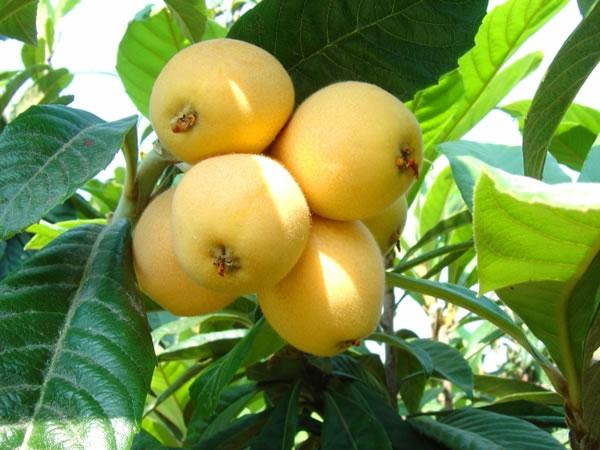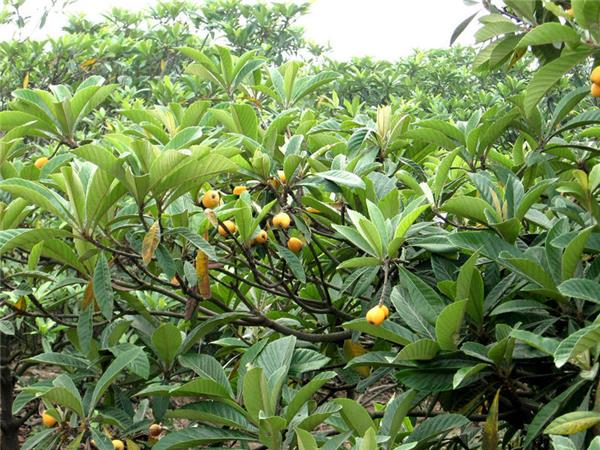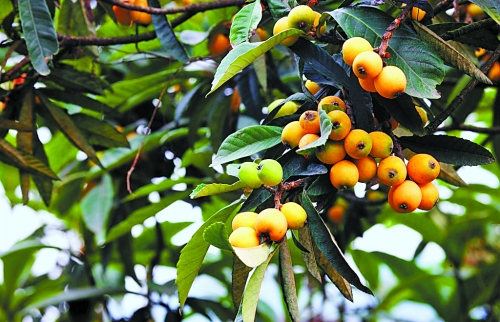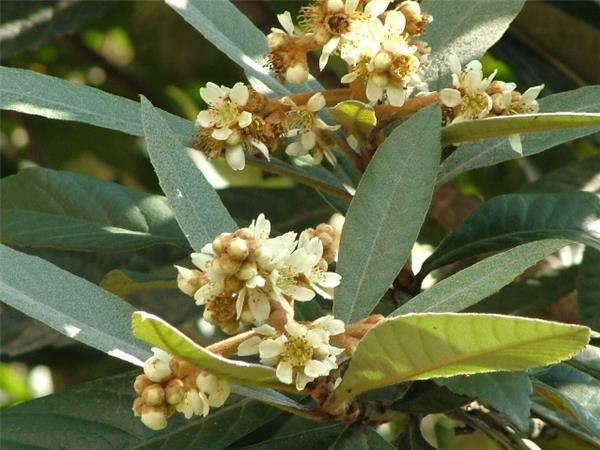Planting techniques and daily management and protection techniques of loquat trees
The planting of loquat trees generally choose more sowing methods, because this is the cheapest, the most economic way, but home-grown loquat flowers, choose the way of planting loquat is also possible.

I. planting techniques of loquat trees
Seed collection treatment: loquat usually takes 15 years to blossom and bear fruit, and the fruiting of its mother tree has obvious difference between big and small years. The seed ripening period is from late October to mid-November. During this period, we should pay close attention to collecting. If the fruit is collected too late, it is easy to be eaten by animals and cannot be collected. After returning, the fruit should be piled up for 3 to 5 days, and the peel should be treated after softening. The fruit was mixed with sand and rubbed to remove the pulp, and the seeds were washed with clean water to dry. The seeds and sand were evenly mixed according to the ratio of 1 ∶ 3, and stored in layers. A thousand seeds weigh about 800 grams, and the amount of seeds used per mu is 30 to 35 kilograms.
Soil preparation and sowing: the nursery should be selected in the sunny, well-drained sandy loam. The nursery should be deeply dug before sowing and disinfected with 3% quicklime. Seedbed width 1.2 meters, bed height 20 meters, bed surface to be meticulous and smooth, remove stones, weeds, side ditches, trails should be straight, the bottom of the ditch should be flat, not stagnant water. Sowing in early March, sowing can be on demand or strip sowing. The row spacing of on-demand plant is 10 × 25 cm, the row spacing of strip sowing is 30 cm, and the depth of sowing ditch is 8 to 10 cm. First put rotten cake fertilizer at the bottom of the ditch, and then put a layer of loess 5 meters thick to cover the base fertilizer before sowing. After sowing, cover the seeds with a layer of loess 2 meters thick, which is beneficial to reduce weeds among seedlings, promote the growth of seedling roots, and finally cover with a layer of rice straw to moisturize.

2. Pruning techniques of loquat trees
1. Erasing buds: in the stage of fruit shaping at the end of young trees, in order to make rational allocation of main branches, secondary main branches and branch groups, buds with suitable direction and position are selected when budding, and the excess buds are erased in order to concentrate nutrients to cultivate strong main branches, secondary main branches, and so on. By wiping buds, adult trees can reduce the number of branches, enrich and strengthen the fruiting branch group, which is beneficial to fruiting.
two。 Thinning and pruning: loquat has the characteristics of whorled branches, and the delamination distance is dense, forming crown branches with more and less down, more outside and less inside, and lack of light. Therefore, it is necessary to remove dense branches, weak branches, overlapping branches, crossed branches, long branches and redundant branches or weak branches without space development in the crown.
3. Thinning and deletion: in the area where there is no frost injury, in order to adjust the size of the year and ensure high and stable yield in successive years, the fruiting branches of the big year should be thinned and deleted in the full fruit period. The ratio of fruiting branches to growing branches on the whole tree is usually 3:2. If there are too few developing branches, it is necessary to cut off some of the flowers on the fruiting branches and make them mature in the following year. If the branches with less than 3 large leaves on both the mother branch and the fruit branch are weak branches, they can be deleted from the base, and if there is some space or is empty after cutting, they can leave 1 or 2 leaves to retract.

III. Florescence management of loquat trees
Ear thinning and flower thinning cut the dense and weak flower ear from the connection between the fruiting branch and the flower ear, and the whole ear was removed; according to the tree potential, the number of sparse ears accounted for 20% of the total tree.
Extra-root topdressing should be applied several times to avoid malnutrition caused by a large number of flowering; 0.2% urea solution or potassium dihydrogen phosphate solution should be sprayed every 3 days.
The flowering period of loquat trees to prevent drought is in the autumn and winter season with drought and little rain. In order to improve the pollination rate, trunk spraying or inter-garden furrow irrigation can be used in sunny mornings.
The main pest control is scab, which can be sprayed with Baume 0.3 degree stone sulfur mixture for 1-2 times at the initial stage of the disease, and the main pest is yellow caterpillar, which harms autumn and fruiting branches and leaves. During the control, 90% trichlorfon 500 times solution or dichlorvos 800 times solution can be sprayed during the main stage of larval occurrence.
Spraying growth regulators to promote flower bud development and improve fruit setting rate should be sprayed with 80-120 times of cytokinin or 0.1% benzylpurine solution to protect flowers.

Loquat trees can not only be used to decorate and beautify the courtyard, but now the dwarfed loquat trees can also be moved indoors for pot culture, and no matter which planting method, as long as properly maintained, loquat trees can bear fruitful fruits, which sounds really exciting.
- Prev

Propagation mode of Cryptomeria fortunei and matters needing attention in transplanting
Propagation mode of Cryptomeria fortunei and matters needing attention in transplanting
- Next

The characteristics of Japanese early Sakura the difference between Japanese early Sakura and Japanese late Sakura
The characteristics of Japanese early Sakura the difference between Japanese early Sakura and Japanese late Sakura
Related
- Wuhan Hospital Iron Tree Blooming Result Was Instantly Frightened by the Gardener Master
- Which variety of camellia is the most fragrant and best? Which one do you like best?
- What is the small blue coat, the breeding methods and matters needing attention of the succulent plant
- Dormancy time and maintenance management of succulent plants during dormancy
- Minas succulent how to raise, Minas succulent plant pictures
- What are the varieties of winter succulent plants
- How to raise succulent plants in twelve rolls? let's take a look at some experience of breeding twelve rolls.
- Attention should be paid to water control for succulent plants during dormant period (winter and summer)
- Watering experience of twelve rolls of succulent plants
- Techniques for fertilizing succulent plants. An article will let you know how to fertilize succulent plants.

